Beth Revis's Blog, page 33
May 15, 2012
On E-Books
Just found this great article on the evolution of e-books, and wanted to share. Click through for a larger graphic and more info:
[image error]
I can only speak for myself, but here's what I've noticed in my own reading practices:
I have bought the same number of print books since owning an e-reader as before
But I have also bought an increasing number of e-books
I will typically buy print books from authors I know I like, books I want to get signed, or books I know I will want to re-read and/or complete a set (for example, the final book of a trilogy)
But I take chances on e-books--I will typically purchase an ebook that is written by an author I've never tried before, is outside my typical reading comfort zone, etc.
If I like the ebook, I will sometimes also then purchase the print book to keep
Price is rarely a factor in my ebook purchases. I will sometimes take a chance on a book that's $3 or less that I wouldn't normally, but I buy just as many $10 ebooks as I don't buy $1 ebooks. I care more about whether or not it's a title that I want to read than the price.
That said, I've only ever paid more than $10 once, and that was for an "enhanced edition" because I was curious about what made it "enhanced." I was disappointed; I will be more cautious with future "enhanced editions," particularly over $10.
But the important thing that I'm taking away from these thoughts is this: I buy more books, both print and electronic, than I did before, and I'm buying a wider variety of books. I can't help but see this as a good thing.
You? How has the introduction of ebooks changed your reading habits...or has it not?

[image error]
I can only speak for myself, but here's what I've noticed in my own reading practices:
I have bought the same number of print books since owning an e-reader as before
But I have also bought an increasing number of e-books
I will typically buy print books from authors I know I like, books I want to get signed, or books I know I will want to re-read and/or complete a set (for example, the final book of a trilogy)
But I take chances on e-books--I will typically purchase an ebook that is written by an author I've never tried before, is outside my typical reading comfort zone, etc.
If I like the ebook, I will sometimes also then purchase the print book to keep
Price is rarely a factor in my ebook purchases. I will sometimes take a chance on a book that's $3 or less that I wouldn't normally, but I buy just as many $10 ebooks as I don't buy $1 ebooks. I care more about whether or not it's a title that I want to read than the price.
That said, I've only ever paid more than $10 once, and that was for an "enhanced edition" because I was curious about what made it "enhanced." I was disappointed; I will be more cautious with future "enhanced editions," particularly over $10.
But the important thing that I'm taking away from these thoughts is this: I buy more books, both print and electronic, than I did before, and I'm buying a wider variety of books. I can't help but see this as a good thing.
You? How has the introduction of ebooks changed your reading habits...or has it not?

Published on May 15, 2012 21:00
May 14, 2012
Life and Death
I love this beautiful, poetic video about life and death. The images are stunning and so evocative.
Anyone else reminded of Kirsten Miller's THE ETERNAL ONES with some of the imagery in the video?
The video itself was inspired by an Edgar Allan Poe, and I originally found it through this fascinating article about Poe and a specific artist-illustrated version. If you like Poe--or are just a fan of 20s art, creepy stuff, etc.--I encourage you to click through. I have already purchased my own reprint of the book :)

Anyone else reminded of Kirsten Miller's THE ETERNAL ONES with some of the imagery in the video?
The video itself was inspired by an Edgar Allan Poe, and I originally found it through this fascinating article about Poe and a specific artist-illustrated version. If you like Poe--or are just a fan of 20s art, creepy stuff, etc.--I encourage you to click through. I have already purchased my own reprint of the book :)

Published on May 14, 2012 21:00
Comment to Win--6 Books!
All last week (Monday through Saturday) I did an interview with a different author--and every single interview was paired with a giveaway.
I will close the contest at 7pm EST, and announce winners sometime before midnight. So you've still got a little time left to enter six different contests! You can enter any or all of them, and all you need to do to enter is leave a comment at the interview post, linked below.
Win a copy of Cole Gibsen's debut, KATANA
Win a SIGNED copy of Marissa Meyer's debut, CINDER
Win a ARC of Saundra Mitchell's most recent title, THE SPRINGSWEET
Win a SIGNED ARC of Marie Lu's debut, LEGEND
Win a SIGNED ARC of Robin LaFever's YA historical fantasy, GRAVE MERCY
Win a ARC of Angie Smibert's THE FORGETTING CURVE


I will close the contest at 7pm EST, and announce winners sometime before midnight. So you've still got a little time left to enter six different contests! You can enter any or all of them, and all you need to do to enter is leave a comment at the interview post, linked below.
Win a copy of Cole Gibsen's debut, KATANA
Win a SIGNED copy of Marissa Meyer's debut, CINDER
Win a ARC of Saundra Mitchell's most recent title, THE SPRINGSWEET
Win a SIGNED ARC of Marie Lu's debut, LEGEND
Win a SIGNED ARC of Robin LaFever's YA historical fantasy, GRAVE MERCY
Win a ARC of Angie Smibert's THE FORGETTING CURVE

Published on May 14, 2012 08:00
May 11, 2012
Interview Week: Angie Smibert, Author of the Forgetting Curve
Welcome to Interview Week!
All this week, I'm interviewing awesome authors--and giving away a copy of their book! Come back each day this week for another author and another chance to win an awesome book.
Quick Stats on Today's Author:
Angie Smibert's debut, MEMENTO NORA released last year to critical acclaim, and she's following it with the sequel, THE FORGETTING CURVE
She is also a fellow writer in The League of Extraordinary Writers
Her books' website is chock-full of fun stuff, including inspiring art, lesson plans, and more!
Angie has links to NASA that I'm quite envious of...
YOU
We can read all
about your life from your bio in the jacket flap of your book. So, what's a
completely random fact about you that most people don't know?
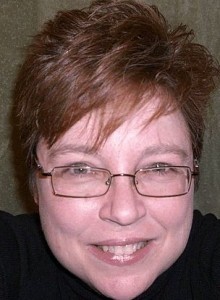
I have a gray cat named Brick, which most people think is really
strange. Even when I mention that the other cat is Maggie. (Bonus points if
anyone can name the literary reference. Hint: think Paul Newman and Elizabeth
Taylor.)
As a kid, what was your favorite book?
Have your tastes changed since growing up?
I remember reading all the Walter Farley horse books—Black
Stallion, Black Stallion Returns, etc. That may have been where I developed a
love of a good series—or just a good author with a lot of books. My tastes may
have changed in terms of what I read,
but I still like to inhale a good series. (btw, right now, I’m reading
Charlaine Harris’ latest Sookie Stackhouse book, Deadlocked. I think it’s the
12th in the series.)
Your most recent
title, THE FORGETTING CURVE, is a sequel to your debut, MEMENTO NORA. How was
writing a sequel different from writing the first book?
You’d think it would be easier. NOT. First of all, the timeline was compressed. (See below.) Second,
what I originally thought was going to happen (plot-wise) changed—for the
better—but it was painful to let that initial idea go. It just didn’t move the
series forward. Important lesson in sequels: you need to cover new ground.
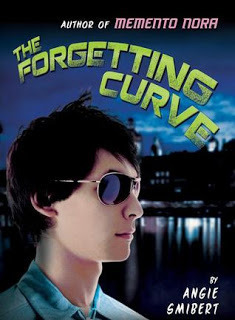
YOUR BOOK
It's the inevitable question: what
inspired THE FORGETTING CURVE?
Originally, I’d envisioned Memento Nora as a stand-alone. The
initial inspiration for the Forgetting Curve was something my editor asked when
we were working on the first one. At the end, Nora’s mom spits out her pill and
tells her what happened. Would Nora believe her? I realized then that the old
Nora wouldn’t. So I wrote a draft
where Nora, Micah, and Winter try to rediscover some of what they learned in
book 1. Like I said above, that didn’t work, but rethinking the premise of this
book led me a new, better direction. Which is why I brought in Aiden.
One of the things
that stood out to me in THE FORGETTING CURVE was the way the kids used art as aform of rebellion. Was there
any specific artist or work of art that inspired this inclusion?
In the first book, MEMENTO NORA, the kids create an underground
comic. In the second one, someone in the community (no spoilers) has created an
underground low-power FM station (MemeCast) to circulate news that isn’t
otherwise available and to give people (kids mostly) a venue for self-expression.
Velvet and the boys write and play music inspired by the MemeCast, and they
(little spoiler) do get their music played on the ‘cast.
One of the inspirations for the ‘cast was a low power FM station
set up by hackers on the Gulf Coast after Katrina. (I have a little more info and links on my book site: http://www.mementonora.com/inspirations/low-power-fm-2) Since all forms of
communication—phones, radio, tv, cellphones-- were wiped out during the storm
and for a long time afterwards, the station provided the community with
information it needed. And the transmitter did fit in a lunchbox.
Can you tell us
a little bit about the process--particularly the timeline--of writing &
publishing THE FORGETTING CURVE?
I wrote a full draft of FC the summer before Memento Nora came
out. However, that version was off the mark. (In other words, the publisher
didn’t buy it—and rightly so.) Then I rethought it and wrote a proposal
(outline and three chapters) for the new version, which they did buy early in
Spring 2011. But, the kicker was that they wanted it for Spring 2012. That meant
finishing it by Memorial Day so we could do edits and have it to copyediting by
the end of the summer. So I was finishing the draft on the train to BEA that
year.
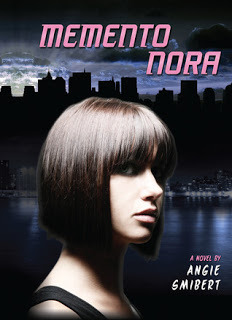
If your reader
could only take away one emotion, theme, or idea from THE FORGETTING CURVE,
what would you want it to be?
Good question. Mike Mullin did a great review of the book (for theLeague) where he touched on some key underlying concepts. But, I think
basically the idea is to not take anything on face value. Question authority,
whoever that may be.
YOUR WRITING
Beyond the
typical--never give up, believe in yourself--what would be the single best
advice you'd like to give another writer?
Buy a good chair. Seriously. My back is paying the price.
What do you
think are your strongest and weakest points in writing?
Strongest: voice, conciseness, creative settings
Weakest: plot, underwriting
And now for a giveaway! Leave a comment with your email address below to be entered to win a ARC copy of THE FORGETTING CURVE! One winner will be picked next Monday; sorry, but this needs to be North America only.

All this week, I'm interviewing awesome authors--and giving away a copy of their book! Come back each day this week for another author and another chance to win an awesome book.
Quick Stats on Today's Author:
Angie Smibert's debut, MEMENTO NORA released last year to critical acclaim, and she's following it with the sequel, THE FORGETTING CURVE
She is also a fellow writer in The League of Extraordinary Writers
Her books' website is chock-full of fun stuff, including inspiring art, lesson plans, and more!
Angie has links to NASA that I'm quite envious of...
YOU
We can read all
about your life from your bio in the jacket flap of your book. So, what's a
completely random fact about you that most people don't know?

I have a gray cat named Brick, which most people think is really
strange. Even when I mention that the other cat is Maggie. (Bonus points if
anyone can name the literary reference. Hint: think Paul Newman and Elizabeth
Taylor.)
As a kid, what was your favorite book?
Have your tastes changed since growing up?
I remember reading all the Walter Farley horse books—Black
Stallion, Black Stallion Returns, etc. That may have been where I developed a
love of a good series—or just a good author with a lot of books. My tastes may
have changed in terms of what I read,
but I still like to inhale a good series. (btw, right now, I’m reading
Charlaine Harris’ latest Sookie Stackhouse book, Deadlocked. I think it’s the
12th in the series.)
Your most recent
title, THE FORGETTING CURVE, is a sequel to your debut, MEMENTO NORA. How was
writing a sequel different from writing the first book?
You’d think it would be easier. NOT. First of all, the timeline was compressed. (See below.) Second,
what I originally thought was going to happen (plot-wise) changed—for the
better—but it was painful to let that initial idea go. It just didn’t move the
series forward. Important lesson in sequels: you need to cover new ground.

YOUR BOOK
It's the inevitable question: what
inspired THE FORGETTING CURVE?
Originally, I’d envisioned Memento Nora as a stand-alone. The
initial inspiration for the Forgetting Curve was something my editor asked when
we were working on the first one. At the end, Nora’s mom spits out her pill and
tells her what happened. Would Nora believe her? I realized then that the old
Nora wouldn’t. So I wrote a draft
where Nora, Micah, and Winter try to rediscover some of what they learned in
book 1. Like I said above, that didn’t work, but rethinking the premise of this
book led me a new, better direction. Which is why I brought in Aiden.
One of the things
that stood out to me in THE FORGETTING CURVE was the way the kids used art as aform of rebellion. Was there
any specific artist or work of art that inspired this inclusion?
In the first book, MEMENTO NORA, the kids create an underground
comic. In the second one, someone in the community (no spoilers) has created an
underground low-power FM station (MemeCast) to circulate news that isn’t
otherwise available and to give people (kids mostly) a venue for self-expression.
Velvet and the boys write and play music inspired by the MemeCast, and they
(little spoiler) do get their music played on the ‘cast.
One of the inspirations for the ‘cast was a low power FM station
set up by hackers on the Gulf Coast after Katrina. (I have a little more info and links on my book site: http://www.mementonora.com/inspirations/low-power-fm-2) Since all forms of
communication—phones, radio, tv, cellphones-- were wiped out during the storm
and for a long time afterwards, the station provided the community with
information it needed. And the transmitter did fit in a lunchbox.
Can you tell us
a little bit about the process--particularly the timeline--of writing &
publishing THE FORGETTING CURVE?
I wrote a full draft of FC the summer before Memento Nora came
out. However, that version was off the mark. (In other words, the publisher
didn’t buy it—and rightly so.) Then I rethought it and wrote a proposal
(outline and three chapters) for the new version, which they did buy early in
Spring 2011. But, the kicker was that they wanted it for Spring 2012. That meant
finishing it by Memorial Day so we could do edits and have it to copyediting by
the end of the summer. So I was finishing the draft on the train to BEA that
year.

If your reader
could only take away one emotion, theme, or idea from THE FORGETTING CURVE,
what would you want it to be?
Good question. Mike Mullin did a great review of the book (for theLeague) where he touched on some key underlying concepts. But, I think
basically the idea is to not take anything on face value. Question authority,
whoever that may be.
YOUR WRITING
Beyond the
typical--never give up, believe in yourself--what would be the single best
advice you'd like to give another writer?
Buy a good chair. Seriously. My back is paying the price.
What do you
think are your strongest and weakest points in writing?
Strongest: voice, conciseness, creative settings
Weakest: plot, underwriting
And now for a giveaway! Leave a comment with your email address below to be entered to win a ARC copy of THE FORGETTING CURVE! One winner will be picked next Monday; sorry, but this needs to be North America only.

Published on May 11, 2012 21:00
May 10, 2012
Interview week: Robin LaFevers, author of GRAVE MERCY
Welcome to Interview Week!
All this week, I'm interviewing awesome authors--and giving away a copy of their book! Come back each day this week for another author and another chance to win an awesome book.
Quick Stats on Today's Author:
Robin LaFevers is the author of GRAVE MERCY, a YA Historical, as well as two middle grade series: Nathaniel Fludd, Beastologist; and the Theodosia books
Related: Robin has some of the best cover art around. I'm personally a fan of the Theodosia covers, but the Nathaniel covers are gorgeous and interesting, and the cover for GRAVE MERCY just kicks @$$.
She has one of the prettiest website around. This is what an author website should look like, y'all.
Robin is also extremely smart, and knows her history.
Robis is the co-writer of the Shrinking Violets blog (a must for any author) and blogs at Writers Unboxed. She claims to be introverted, but she dealt with my obsessive fangirling rather well :)
YOU
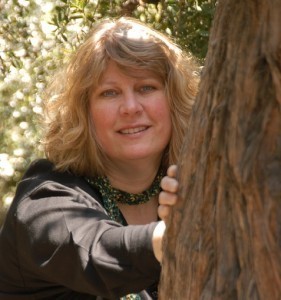
We can read all about your life from your
bio in the jacket flap of your book. So, what's a completely random fact about
you that most people don't know?
I
have the blackest of black thumbs and kill every plant I touch. I have been
ordered to stay out of our garden, except to look, and we do not own a single
houseplant.
As a kid, what was your favorite book?
Have your tastes changed since growing up?
I know this makes me one of millions, but THE CHRONICLES OF NARNIA
was my hands down favorite when I was a kid. My father gave them to me for my
eighth birthday and I think I read the entire series at least once a year. They
were the first fantasy books I read and I was just gobsmacked by the idea that
authors were allowed to make things up;
they didn’t have to ground their stories in reality. That was the moment I
decided I wanted to make things up for a living. Since I still read fantasy,
and now write it, I would have to say that my tastes haven’t changed much since
then.
What’s the most
interesting historical fact that you discovered while writing GRAVE MERCY,
which takes place in a world based on medieval France? (Either one that ended
up in the book, or one that didn’t make the cut.)
There were so many! It’s hard to pick just one. Because it ended
up being so very central to the story, I would have to say it was the degree to
which the
early Catholic
Church intentionally (as in it was part of the instructions it gave its clergy)
set out to incorporate so many pagan deities, festivals, and locations into
their own tradition. It was a well thought out tactic in luring reluctant
unbelievers into the fold of the church. Gods and goddesses became saints,
Catholic holidays were planned to coincide with pagan festivals, and churches
were built on or near ancient holy sites. In fact, that was one of the sparks
for the book, a photograph of a stone church built right next to a pagan
standing stone.
YOUR BOOK
It's the inevitable question: what
inspired GRAVE MERCY?
I
knew I wanted to write the story of a girl who was utterly powerless and put
her through all the trials and ordeals that would shape her into an instrument
of power—not just physical power, but also the power to stand firmly in her own
self and make her own choices and decisions.
For that kind
of story, I needed a big, sweeping canvas with high stakes and lives and
kingdoms at risk, and a time when teens were in a position shape the world
around them. That search brought me to the middle ages and a world full of
sacred relics, patron saints, and lots of social turbulence.
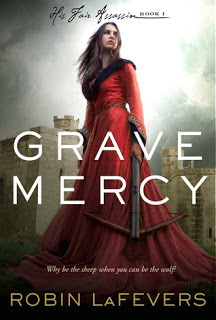 Then
Then
I stumbled across another fascinating research tidbit and learned that many
women in the Middle Ages preferred joining a convent to marriage because
convent life gave them more independence and autonomy than they could ever have
as married women! That kind of lit my imagination on fire and began to play
with what sort of convent would be the best avenue for my heroine’s journey,
and I decided on a convent that would give her power over life and death.
One of the
things that stood out to me in GRAVE MERCY was the way you created a very
realistic girl from a medieval world that would still be sympathetic to readers
today. Can you tell us a little bit about how you balanced the medieval world
and character details with modern readers?
Wow, interesting question! She wasn’t a medieval person to me, she
was simply Ismae, a girl struggling to find her place in this world and carve
out some sense of power over her own life, somewhat universal themes that apply
to any historical time period. So I focused on her core, internal arc first,
and I really do think that those types of archetypal journeys sort of transcend
time—they apply to us all.
One of the things I find most fascinating about writing historical
fantasy is really trying to understand the worldview of people living in
earlier times. What was life like without technology, where there was little
understanding of science or the laws of physics and so much of life felt random
and out of one’s control? Since Ismae belonged to a convent that served Death,
what would her faith look like? How would her devotion be tested? What sorts of
rituals would her life entail? Those questions were in the forefront of my mind
whenever I sat down to write and helped me get into the head of a 15th century
girl—what metaphors and similes would she use? What points of reference would
she have? So that was probably the key to having her feel medieval on the page.
I
also tried to (mostly!) use words that were
only in use prior to the 16th century or phrases that felt reminiscent of that
era. I definitely fudged sometimes; when the choice came down to readability I
went for that over historical accuracy every time, because my overriding goal
was that the story and the voice of Ismae be accessible to today’s teen reader
Can you tell us
a little bit about the process--particularly the timeline--of writing &
publishing GRAVE MERCY?
I first got the
rough glimmers of the idea for this book about seven years ago. I worked on it
for five or six years, squeezing it in between other, contracted novels and
projects, so I was able to take my time researching and building the world of
the story. Because it evolved into such a strange, bizarre idea, I promised
myself I didn’t have to show the finished product to anyone if I didn’t want
to. (This is a little lie I often tell myself that somehow gives me the freedom
I need to get the story down.)
I ended up doing countless drafts, mostly because there were
just so many different directions the story could go in! Not to mention a huge
variety of tones it could take, and it just took me forever to figure out which
story I wanted to tell. I think that’s one of the luxuries we lose once we
become published and are writing on contract—that freedom to play in the world
of story and take our time, so I try to make time in my life for those kind of
projects.
[image error]
However, once I settled on the story I wanted to tell, it
still took me forever to nail the voice. I got halfway through an early draft
and realized that third person POV simply wasn’t working. So I changed the
entire book to first person, which is much, MUCH more than simply changing
pronouns. There is an entire different flow to language and narration when you
change POV. The manuscript flowed much better, but I was still having problems
with the heroine getting lost among the dramatic historical events. It wasn’t until page 350 (of a 420 page
mss) that I realized that the book had to be in first person PRESENT tense. I took to my bed for a
week with a case of the vapors when I realized that. And writing in first
person present is like speaking an entirely different language, so I had to
completely rewrite the whole damn thing—again.
Which taught me an important lesson: experiment with tenses and POVs in
the early stages of a book—just don’t set your POV choice on default mode.
So about seven years from first glimmer to publication, and
about twelve drafts. Not a quick or easy process, but definitely one of the
most rewarding books I’ve ever written.
If your reader
could only take away one emotion, theme, or idea from GRAVE MERCY, what would
you want it to be?
That we owe it to ourselves to wrestle with the concepts of
love and faith and honor and duty. We need to figure out what those mean for
ourselves and not swallow whole the concepts handed to us by others.
YOUR WRITING
What's the most surprising thing you've
learned since becoming a writer?
How exposed I feel. I never expected that, but the deeper you dig
to tell compelling stories, the more you expose parts of yourself, many of them
not even consciously. It is a deeply uncomfortable feeling and not one I would
choose (I am a card carrying introvert, after all) but apparently it is the
tithe I must pay to the writing gods.
Beyond the
typical--never give up, believe in yourself--what would be the single best
advice you'd like to give another writer?
You know that book you’re terrified to write? The one that is too
hard, too scary, too weird, or too damn intimidating. Yeah, that one. That’s the one you need to
write.
(Beth's note: that answer right there, the one above? Possibly the best answer ever.)
What do you
think are your strongest and weakest points in writing?
Evil question! My
weakest points (that I will admit to publicly) are an overfondness for
exclamation points, parenthetical asides, and em dashes. And I am truly terrible
at proofing my own stuff unless I haven’t looked at it for three months.
Probably my
strongest point is that I am always hungry to learn more, try more, take it
farther, deeper, wider. I love that I have a career that allows me to learn new
things every single time I sit down to work, and I try to take full advantage
of that.
And now for a giveaway! Leave a comment with your email address below to be entered to win a ARC copy of GRAVE MERCY--and it's SIGNED! Please note that the ARC has a different cover. One winner will be picked next Monday; sorry, but this needs to be North America only.

All this week, I'm interviewing awesome authors--and giving away a copy of their book! Come back each day this week for another author and another chance to win an awesome book.
Quick Stats on Today's Author:
Robin LaFevers is the author of GRAVE MERCY, a YA Historical, as well as two middle grade series: Nathaniel Fludd, Beastologist; and the Theodosia books
Related: Robin has some of the best cover art around. I'm personally a fan of the Theodosia covers, but the Nathaniel covers are gorgeous and interesting, and the cover for GRAVE MERCY just kicks @$$.
She has one of the prettiest website around. This is what an author website should look like, y'all.
Robin is also extremely smart, and knows her history.
Robis is the co-writer of the Shrinking Violets blog (a must for any author) and blogs at Writers Unboxed. She claims to be introverted, but she dealt with my obsessive fangirling rather well :)
YOU

We can read all about your life from your
bio in the jacket flap of your book. So, what's a completely random fact about
you that most people don't know?
I
have the blackest of black thumbs and kill every plant I touch. I have been
ordered to stay out of our garden, except to look, and we do not own a single
houseplant.
As a kid, what was your favorite book?
Have your tastes changed since growing up?
I know this makes me one of millions, but THE CHRONICLES OF NARNIA
was my hands down favorite when I was a kid. My father gave them to me for my
eighth birthday and I think I read the entire series at least once a year. They
were the first fantasy books I read and I was just gobsmacked by the idea that
authors were allowed to make things up;
they didn’t have to ground their stories in reality. That was the moment I
decided I wanted to make things up for a living. Since I still read fantasy,
and now write it, I would have to say that my tastes haven’t changed much since
then.
What’s the most
interesting historical fact that you discovered while writing GRAVE MERCY,
which takes place in a world based on medieval France? (Either one that ended
up in the book, or one that didn’t make the cut.)
There were so many! It’s hard to pick just one. Because it ended
up being so very central to the story, I would have to say it was the degree to
which the
early Catholic
Church intentionally (as in it was part of the instructions it gave its clergy)
set out to incorporate so many pagan deities, festivals, and locations into
their own tradition. It was a well thought out tactic in luring reluctant
unbelievers into the fold of the church. Gods and goddesses became saints,
Catholic holidays were planned to coincide with pagan festivals, and churches
were built on or near ancient holy sites. In fact, that was one of the sparks
for the book, a photograph of a stone church built right next to a pagan
standing stone.
YOUR BOOK
It's the inevitable question: what
inspired GRAVE MERCY?
I
knew I wanted to write the story of a girl who was utterly powerless and put
her through all the trials and ordeals that would shape her into an instrument
of power—not just physical power, but also the power to stand firmly in her own
self and make her own choices and decisions.
For that kind
of story, I needed a big, sweeping canvas with high stakes and lives and
kingdoms at risk, and a time when teens were in a position shape the world
around them. That search brought me to the middle ages and a world full of
sacred relics, patron saints, and lots of social turbulence.
 Then
ThenI stumbled across another fascinating research tidbit and learned that many
women in the Middle Ages preferred joining a convent to marriage because
convent life gave them more independence and autonomy than they could ever have
as married women! That kind of lit my imagination on fire and began to play
with what sort of convent would be the best avenue for my heroine’s journey,
and I decided on a convent that would give her power over life and death.
One of the
things that stood out to me in GRAVE MERCY was the way you created a very
realistic girl from a medieval world that would still be sympathetic to readers
today. Can you tell us a little bit about how you balanced the medieval world
and character details with modern readers?
Wow, interesting question! She wasn’t a medieval person to me, she
was simply Ismae, a girl struggling to find her place in this world and carve
out some sense of power over her own life, somewhat universal themes that apply
to any historical time period. So I focused on her core, internal arc first,
and I really do think that those types of archetypal journeys sort of transcend
time—they apply to us all.
One of the things I find most fascinating about writing historical
fantasy is really trying to understand the worldview of people living in
earlier times. What was life like without technology, where there was little
understanding of science or the laws of physics and so much of life felt random
and out of one’s control? Since Ismae belonged to a convent that served Death,
what would her faith look like? How would her devotion be tested? What sorts of
rituals would her life entail? Those questions were in the forefront of my mind
whenever I sat down to write and helped me get into the head of a 15th century
girl—what metaphors and similes would she use? What points of reference would
she have? So that was probably the key to having her feel medieval on the page.
I
also tried to (mostly!) use words that were
only in use prior to the 16th century or phrases that felt reminiscent of that
era. I definitely fudged sometimes; when the choice came down to readability I
went for that over historical accuracy every time, because my overriding goal
was that the story and the voice of Ismae be accessible to today’s teen reader
Can you tell us
a little bit about the process--particularly the timeline--of writing &
publishing GRAVE MERCY?
I first got the
rough glimmers of the idea for this book about seven years ago. I worked on it
for five or six years, squeezing it in between other, contracted novels and
projects, so I was able to take my time researching and building the world of
the story. Because it evolved into such a strange, bizarre idea, I promised
myself I didn’t have to show the finished product to anyone if I didn’t want
to. (This is a little lie I often tell myself that somehow gives me the freedom
I need to get the story down.)
I ended up doing countless drafts, mostly because there were
just so many different directions the story could go in! Not to mention a huge
variety of tones it could take, and it just took me forever to figure out which
story I wanted to tell. I think that’s one of the luxuries we lose once we
become published and are writing on contract—that freedom to play in the world
of story and take our time, so I try to make time in my life for those kind of
projects.
[image error]
However, once I settled on the story I wanted to tell, it
still took me forever to nail the voice. I got halfway through an early draft
and realized that third person POV simply wasn’t working. So I changed the
entire book to first person, which is much, MUCH more than simply changing
pronouns. There is an entire different flow to language and narration when you
change POV. The manuscript flowed much better, but I was still having problems
with the heroine getting lost among the dramatic historical events. It wasn’t until page 350 (of a 420 page
mss) that I realized that the book had to be in first person PRESENT tense. I took to my bed for a
week with a case of the vapors when I realized that. And writing in first
person present is like speaking an entirely different language, so I had to
completely rewrite the whole damn thing—again.
Which taught me an important lesson: experiment with tenses and POVs in
the early stages of a book—just don’t set your POV choice on default mode.
So about seven years from first glimmer to publication, and
about twelve drafts. Not a quick or easy process, but definitely one of the
most rewarding books I’ve ever written.
If your reader
could only take away one emotion, theme, or idea from GRAVE MERCY, what would
you want it to be?
That we owe it to ourselves to wrestle with the concepts of
love and faith and honor and duty. We need to figure out what those mean for
ourselves and not swallow whole the concepts handed to us by others.
YOUR WRITING
What's the most surprising thing you've
learned since becoming a writer?
How exposed I feel. I never expected that, but the deeper you dig
to tell compelling stories, the more you expose parts of yourself, many of them
not even consciously. It is a deeply uncomfortable feeling and not one I would
choose (I am a card carrying introvert, after all) but apparently it is the
tithe I must pay to the writing gods.
Beyond the
typical--never give up, believe in yourself--what would be the single best
advice you'd like to give another writer?
You know that book you’re terrified to write? The one that is too
hard, too scary, too weird, or too damn intimidating. Yeah, that one. That’s the one you need to
write.
(Beth's note: that answer right there, the one above? Possibly the best answer ever.)
What do you
think are your strongest and weakest points in writing?
Evil question! My
weakest points (that I will admit to publicly) are an overfondness for
exclamation points, parenthetical asides, and em dashes. And I am truly terrible
at proofing my own stuff unless I haven’t looked at it for three months.
Probably my
strongest point is that I am always hungry to learn more, try more, take it
farther, deeper, wider. I love that I have a career that allows me to learn new
things every single time I sit down to work, and I try to take full advantage
of that.
And now for a giveaway! Leave a comment with your email address below to be entered to win a ARC copy of GRAVE MERCY--and it's SIGNED! Please note that the ARC has a different cover. One winner will be picked next Monday; sorry, but this needs to be North America only.

Published on May 10, 2012 21:00
May 9, 2012
Interview Week: Marie Lu, author of LEGEND
Welcome to Interview Week!
All this week, I'm interviewing awesome authors--and giving away a copy of their book! Come back each day this week for another author and another chance to win an awesome book.
Quick Stats on Today's Author:
Marie Lu is the debut author of LEGEND
The sequel, PRODIGY, will come out later this year, and I cannot wait!!
I was lucky enough to tour with Marie, and I totally kept trying to steal her computer so I could get a sneak peek of PRODIGY
Marie's hero, Day, originally had three sisters and first appeared in novel Marie was writing in high school. You can learn more about it here: http://marielu.org/story1.html
Marie also has excellent taste in tights. Just saying.
YOU
We can read all about your life from your
bio in the jacket flap of your book. So, what's a completely random fact about
you that most people don't know?

I was bitten by a rat when I was three. On my eyelid. I know. I
like to think of it as my Spiderman moment, though, and that someday my
superpowers will manifest. Especially since I was born in the year of the Rat.
That’s got to be some sort of good luck, right?
As a kid, what was your favorite book?
Have your tastes changed since growing up?
My absolute favorite book as a kid was Mattimeo, part of Brian Jacques’s Redwall series. It was my first introduction into the world of
fantasy and sci-fi, and I have to say that my reading tastes haven’t changed
all that much!
In your book,
LEGEND, there’s dystopian government that rules with an iron fist. Because I
had the pleasure of touring with you, I happen to know that you have a little
experience with controlling governments. Can you tell us about this?
(Beth's note: I totally devised this question on purpose because I think Marie has a cool story that goes with this! Advantage to touring: accumulating insider info, lol!)
[image error]
Beth knows all sorts of random secrets about me…. :) Anyway, yes—I’ve definitely experience
some dystopian things when growing up, although my mom was the one who actually
lived through the Cultural Revolution in China (a true, full-blown dystopia). I
was born in China and left for the States in 1989, when I was five years old. At
the time, I lived in Beijing with my aunt, and our home was a few blocks away
from Tiananmen Square. The students in the square protested for a couple of
months leading up to the actual massacre, and for us locals, it was something
of a sightseeing event. My aunt would take me out to the square every weekend
or so to see what the students were up to. I have vague recollections of the
white statue of liberty they erected in the square. I was actually at the
square on the day of the massacre, although I think the shooting didn’t happen
until later that night. I distinctly remember seeing the tanks out in the streets,
and that kindergarten was canceled the following day. Of course, I didn’t
understand the full magnitude of this event until I was older, but a Tiananmen
Square-inspired scene does appear in Legend.
YOUR BOOK
It's the inevitable question: what inspired
LEGEND?
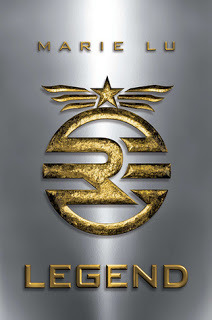
One day in 2009, I was sprawled on the carpet in my living room
and lazily watching TV (this is how I daydream), and the movie version of Les
Miserables was on. As I watched the criminal Jean Valjean face off against
police detective Javert, I started thinking about how fun it would be to write
a teenage version of this premise: a sharp young criminal versus an equally
formidable teen detective. The thing that inspired Legend’s dystopian setting
was when I saw a map online of what the world would look like if all of our
freshwater ice melted and our oceans rose 100 meters. It was a fascinating,
terrifying map, and since I live in Los Angeles, I immediately thought about
what a half-flooded LA would be like.
One of the things
that stood out to me in LEGEND was the strong theme of love—and not just
romantic love. Both June and Day have strong ties to their families. Is love in
varied forms a theme you intended to bring in, or was it a happy accident while
writing.
I think a lot of the love themes came into the story by accident,
although I can totally see why they snuck onto the page. I’m an only child (a
product of China’s One Child policy!), and I’ve always wondered what it would
be like to have siblings. As a result, almost everything I write involves
strong sibling friendships, rivalries, and/or dark pasts.
Can you tell us
a little bit about the process--particularly the timeline--of writing &
publishing LEGEND?
Oh man—Beth knows my looooong road to publication. Legend was my
fifth manuscript. At the time, I had another (unpublished) story that my agent
was pitching, and while we slowly received rejections back on it, I distracted
myself by writing Legend. Legend came relatively quickly to me—the first draft
took about 5 months, and then my agent and I did two big revisions on it. I’d
say the whole writing process took about 9 months. We sent it out in late
summer of 2010 and it sold at auction a couple of weeks later. Considering that
I pitched my very first manuscript when I was fifteen, I’d say it only took two
weeks and twelve years!
If your reader
could only take away one emotion, theme, or idea from LEGEND, what would you
want it to be?
Day’s motto in the book is: ‘Walk in the light’. I suppose this is
the takeaway idea from the story—to Day, ‘walking in the light’ means seeking
out the truth and refusing to take the world around you at face value. Not
everything is as it seems in the real world, either, and I hope people always
seek to find out how their everyday decisions really impact their society.
‘Walking in the light’ also symbolizes doing the right thing and being a moral
person, even when you’re surrounded by darkness.
YOUR WRITING
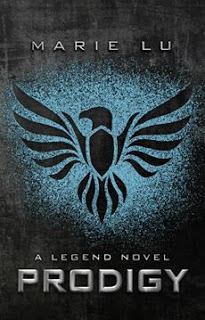
What's the most surprising thing you've
learned since becoming a writer?
I’ve learned that there are so many more elements to a writer’s
job than just writing, something I never really considered until Legend sold. There’s the marketing and
promotion, chatting with readers, touring, meeting people, traveling….all
wonderful and fun things, but definitely unexpected!
Beyond the
typical--never give up, believe in yourself--what would be the single best
advice you'd like to give another writer?
Don’t be afraid to write a bad book. Sometimes you have to squeeze
all the bad stuff out before you can get to the good stuff, and don’t be
intimidated by the idea that you have to set aside something that just isn’t
working and begin on an entirely new story. Staring at a blank page is one of
the most terrifying sights a writer can see, but you have to be able to let go
of bad writing.
What do you
think are your strongest and weakest points in writing?
I think my strongest point might be character creation, only
because I’m borderline obsessive-compulsive about it. My character profile
sheets are ridiculously long and I have to know as much as I possibly can about
all of my characters before I can start writing. I know silly things like their
blood types and hexadecimal color codes for their skin/hair/eye colors. I have
no idea why. My weakest point? Outlining. I suck so hard at outlining. Every
time I attempt one, I veer off by the fourth chapter because my characters have
wandered off onto their own path, leaving me to scramble after them. It makes
for some very haphazard first drafts.
And now for a giveaway! Leave a comment with your email address below to be entered to win a ARC copy of LEGEND--and it's SIGNED! One winner will be picked next Monday; sorry, but this needs to be North America only.

All this week, I'm interviewing awesome authors--and giving away a copy of their book! Come back each day this week for another author and another chance to win an awesome book.
Quick Stats on Today's Author:
Marie Lu is the debut author of LEGEND
The sequel, PRODIGY, will come out later this year, and I cannot wait!!
I was lucky enough to tour with Marie, and I totally kept trying to steal her computer so I could get a sneak peek of PRODIGY
Marie's hero, Day, originally had three sisters and first appeared in novel Marie was writing in high school. You can learn more about it here: http://marielu.org/story1.html
Marie also has excellent taste in tights. Just saying.
YOU
We can read all about your life from your
bio in the jacket flap of your book. So, what's a completely random fact about
you that most people don't know?

I was bitten by a rat when I was three. On my eyelid. I know. I
like to think of it as my Spiderman moment, though, and that someday my
superpowers will manifest. Especially since I was born in the year of the Rat.
That’s got to be some sort of good luck, right?
As a kid, what was your favorite book?
Have your tastes changed since growing up?
My absolute favorite book as a kid was Mattimeo, part of Brian Jacques’s Redwall series. It was my first introduction into the world of
fantasy and sci-fi, and I have to say that my reading tastes haven’t changed
all that much!
In your book,
LEGEND, there’s dystopian government that rules with an iron fist. Because I
had the pleasure of touring with you, I happen to know that you have a little
experience with controlling governments. Can you tell us about this?
(Beth's note: I totally devised this question on purpose because I think Marie has a cool story that goes with this! Advantage to touring: accumulating insider info, lol!)
[image error]
Beth knows all sorts of random secrets about me…. :) Anyway, yes—I’ve definitely experience
some dystopian things when growing up, although my mom was the one who actually
lived through the Cultural Revolution in China (a true, full-blown dystopia). I
was born in China and left for the States in 1989, when I was five years old. At
the time, I lived in Beijing with my aunt, and our home was a few blocks away
from Tiananmen Square. The students in the square protested for a couple of
months leading up to the actual massacre, and for us locals, it was something
of a sightseeing event. My aunt would take me out to the square every weekend
or so to see what the students were up to. I have vague recollections of the
white statue of liberty they erected in the square. I was actually at the
square on the day of the massacre, although I think the shooting didn’t happen
until later that night. I distinctly remember seeing the tanks out in the streets,
and that kindergarten was canceled the following day. Of course, I didn’t
understand the full magnitude of this event until I was older, but a Tiananmen
Square-inspired scene does appear in Legend.
YOUR BOOK
It's the inevitable question: what inspired
LEGEND?

One day in 2009, I was sprawled on the carpet in my living room
and lazily watching TV (this is how I daydream), and the movie version of Les
Miserables was on. As I watched the criminal Jean Valjean face off against
police detective Javert, I started thinking about how fun it would be to write
a teenage version of this premise: a sharp young criminal versus an equally
formidable teen detective. The thing that inspired Legend’s dystopian setting
was when I saw a map online of what the world would look like if all of our
freshwater ice melted and our oceans rose 100 meters. It was a fascinating,
terrifying map, and since I live in Los Angeles, I immediately thought about
what a half-flooded LA would be like.
One of the things
that stood out to me in LEGEND was the strong theme of love—and not just
romantic love. Both June and Day have strong ties to their families. Is love in
varied forms a theme you intended to bring in, or was it a happy accident while
writing.
I think a lot of the love themes came into the story by accident,
although I can totally see why they snuck onto the page. I’m an only child (a
product of China’s One Child policy!), and I’ve always wondered what it would
be like to have siblings. As a result, almost everything I write involves
strong sibling friendships, rivalries, and/or dark pasts.
Can you tell us
a little bit about the process--particularly the timeline--of writing &
publishing LEGEND?
Oh man—Beth knows my looooong road to publication. Legend was my
fifth manuscript. At the time, I had another (unpublished) story that my agent
was pitching, and while we slowly received rejections back on it, I distracted
myself by writing Legend. Legend came relatively quickly to me—the first draft
took about 5 months, and then my agent and I did two big revisions on it. I’d
say the whole writing process took about 9 months. We sent it out in late
summer of 2010 and it sold at auction a couple of weeks later. Considering that
I pitched my very first manuscript when I was fifteen, I’d say it only took two
weeks and twelve years!
If your reader
could only take away one emotion, theme, or idea from LEGEND, what would you
want it to be?
Day’s motto in the book is: ‘Walk in the light’. I suppose this is
the takeaway idea from the story—to Day, ‘walking in the light’ means seeking
out the truth and refusing to take the world around you at face value. Not
everything is as it seems in the real world, either, and I hope people always
seek to find out how their everyday decisions really impact their society.
‘Walking in the light’ also symbolizes doing the right thing and being a moral
person, even when you’re surrounded by darkness.
YOUR WRITING

What's the most surprising thing you've
learned since becoming a writer?
I’ve learned that there are so many more elements to a writer’s
job than just writing, something I never really considered until Legend sold. There’s the marketing and
promotion, chatting with readers, touring, meeting people, traveling….all
wonderful and fun things, but definitely unexpected!
Beyond the
typical--never give up, believe in yourself--what would be the single best
advice you'd like to give another writer?
Don’t be afraid to write a bad book. Sometimes you have to squeeze
all the bad stuff out before you can get to the good stuff, and don’t be
intimidated by the idea that you have to set aside something that just isn’t
working and begin on an entirely new story. Staring at a blank page is one of
the most terrifying sights a writer can see, but you have to be able to let go
of bad writing.
What do you
think are your strongest and weakest points in writing?
I think my strongest point might be character creation, only
because I’m borderline obsessive-compulsive about it. My character profile
sheets are ridiculously long and I have to know as much as I possibly can about
all of my characters before I can start writing. I know silly things like their
blood types and hexadecimal color codes for their skin/hair/eye colors. I have
no idea why. My weakest point? Outlining. I suck so hard at outlining. Every
time I attempt one, I veer off by the fourth chapter because my characters have
wandered off onto their own path, leaving me to scramble after them. It makes
for some very haphazard first drafts.
And now for a giveaway! Leave a comment with your email address below to be entered to win a ARC copy of LEGEND--and it's SIGNED! One winner will be picked next Monday; sorry, but this needs to be North America only.

Published on May 09, 2012 21:00
May 8, 2012
Interview Week, Saundra Mitchell, author of THE SPRINGSWEET
Welcome to Interview Week!
All this week, I'm interviewing awesome authors--and giving away a copy of their book! Come back each day this week for another author and another chance to win an awesome book.
Quick Stats on Today's Author:
Saundra Mitchell is the author of THE SPRINGSWEET, as well as THE VESPERTINE and SHADOWED SUMMER.
She is also the author of BREATHKEPT, which you can download for free here
Saundra does interviews on her blog, too, and one of the interview questions she uses came from iCarly, which immediately makes her 20% cooler in my book.
If you're an aspiring author, you must check out Saundra's resources on publicity and marketing
YOU
We
can read all about your life from your bio in the jacket flap of your book. So,
what's a completely random fact about you that most people don't know?
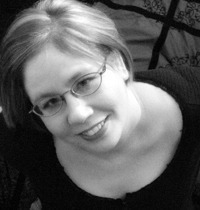
I absolutely don't recommend this, but I hitchhiked from Helena,
MT to Los Angeles, CA with a guy who would, several years later, become my
husband. We learned several things during that trip.
1) If kids could drive, we would have been to LA in 8 hours. 2)
Mormons are incredibly nice even if they can't give you a ride. 3) Los Angeles
will (used to?) pay for bus tickets to send you anywhere in the US, if that
meant you wouldn't be homeless in their city.
As
a kid, what was your favorite book? Have your tastes changed since growing up?
My favorite books in order of development were BRIDGE TO TERABITHIA,
THE OUTSIDERS, IT and THE SILVER KISS. You'll note that the first two books are
about poor kids who escape into their imagination and into books. The second
two books are about people who escape the darkness in their lives through
magic...
And every single one of them has a body count. Which is my
motto—it's not a book without a body count. I still read books like these (and
I try to write books like these, they all inspired me so much.) I re-read these
particular books every so often and even though I see them differently each
time because I've grown up a little more, they still move me.
In
your books THE VESPERTINE and THE SPRINGSWEET, the main characters live in a
historical world close to our own America in the turn of the century—but with a
touch of magic. If you could, would you live in this world and time period?
Nooooooo. Not in a million years. I'm fascinated by the past. I
love history and archaeology. It gives me genuine pleasure to the past, and to
try to bring it to life. But I really like living in a world with plumbing and
antibiotics.
But the universe? I'm not entirely sure I don't live in this
universe; you probably live there, too! People may well have strange,
unaccountable abilities, and magic quite possibly moves the earth. I've seen
some remarkable, inexplicable things in my time. I'm not prepared to say
there's no magic in the world.
YOUR BOOK
It's
the inevitable question: what inspired THE SPRINGSWEET?
My best friend. I sold THE VESPERTINE as a standalone, so going
into THE SPRINGSWEET, I only knew two things: it would be about Zora, and it
had to have water and earth in it. Other than that, it was all open.
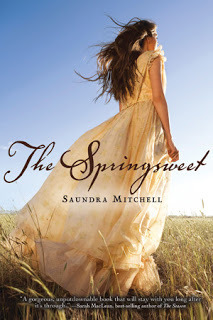
I originally wanted to set it in 1893 in Chicago, because of the
World's Fair. Chicago just didn't mesh with earth and water, though—it's more
of a fire and air kind of town.
So I decided since I was writing a novel about my best friend's
favorite character, that I would write a novel that catered to her tastes. As
many things she loved, as I could reasonably fit into the framework—and that
meant writing a western.
As soon as I started my research, I came across a book called
HEARTS WEST, about mail order brides during the western expansion. And I knew
then exactly where the book would go.
From the dedication to the acks, this book is a love letter to my
best friend. ILU WENDI!
Can
you tell us a little bit about the process--particularly the timeline--of
writing & publishing THE SPRINGSWEET?
As mentioned, I had no idea that I would get to write a sequel for
THE VESPERTINE. I sold that one in December of 2009, about seven months after
we started submitting it to editors. It was a one book deal, and I went through
the entire revision process with my editor before turning in a proposal for THE
SPRINGSWEET.
So it went something like, THE VESPERTINE went out in March 2009
for submission. It was acquired in December 2009. I got my revision letter, I
think, in February of 2010. All revisions on THE VESPERTINE were complete and I
submitted my proposal for THE SPRINGSWEET in April 2010.
So I actually wrote the first three chapters of THE SPRINGSWEET in
spring of 2010. I didn't get an answer until July of 2010. As soon as Houghton
picked it up, I started writing again. I finished the first draft and the round
of beta critiques by mid-October, 2010 and turned it in to my editor.
I got my revision letter for THE SPRINGSWEET in March 2011, and I
think I finished my revisions by June 2011. I saw parts of the phtotoshoot for
the cover in September, and the final cover came in October, I believe.
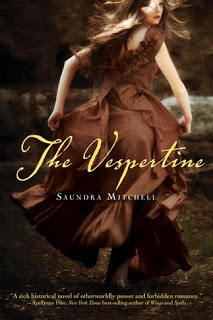
It comes out April 17, 2012, so it's been a three-year process
total to get the book to the shelves, but about two years total for THE
SPRINGSWEET alone. So for anybody out there fantasizing about the fast track, I
apologize. Even the fast track in publishing is pretty slow!
If
your reader could only take away one emotion, theme, or idea from THE
SPRINGSWEET, what would you want it to be?
No matter what happens, or how your plans change, you can begin
again. You can always begin again.
YOUR WRITING
What's
the most surprising thing you've learned since becoming a writer?
What revision really is. Before my first novel was published, I
thought revising was polishing, maybe moving some words around or adding a bit
here or there to perfect a finished piece. Now I know those are line edits,
which come much later.
Revision—real revision—often means deleting some, most or all of
the original draft to get to the real blood and bones. Revision has more in
common with cleaning fish than it does polishing the silver.
Beyond
the typical--never give up, believe in yourself--what would be the single best
advice you'd like to give another writer?
Writing and publishing are two different things. Writing is art;
publishing is business. They intersect, sometimes in amazing and terrible ways,
but they're not the same thing.
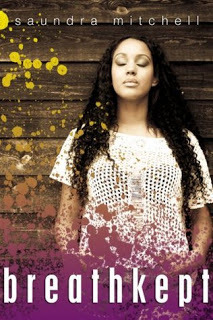
So my best advice to aspiring authors is to remember that once you
sell your words, you're not doing art anymore. Think long and hard about
whether you want to go into business,.Writing will always be there, whether you
publish or not.
What
do you think are your strongest and weakest points in writing?
I think I'm particularly good at atmosphere and dialogue. I love
creating places and voices.
My books aren't as plot-oriented as they could be, though. And my
endings come fast [screenwriting style!] which bugs a lot of people.
I've done a lot of thinking lately how I can shift the beats in my
books a little. It can be tricky, though. I don't want to bore anyone by adding
the wrong things!
An important note about the prize for today's post: you'll be receiving an ARC of THE SPRINGSWEET. ARCs are Advanced Reader Copies, and they're not final. Saundra has written an open letter about this edition of the book: neither line 3 nor 4 on
page 249 appear in the final book.
And now for a giveaway! Leave a comment with your email address below to be entered to win a copy of THE SPRINGSWEET--and it's SIGNED! One winner will be picked next Monday; sorry, but this needs to be North America only.


All this week, I'm interviewing awesome authors--and giving away a copy of their book! Come back each day this week for another author and another chance to win an awesome book.
Quick Stats on Today's Author:
Saundra Mitchell is the author of THE SPRINGSWEET, as well as THE VESPERTINE and SHADOWED SUMMER.
She is also the author of BREATHKEPT, which you can download for free here
Saundra does interviews on her blog, too, and one of the interview questions she uses came from iCarly, which immediately makes her 20% cooler in my book.
If you're an aspiring author, you must check out Saundra's resources on publicity and marketing
YOU
We
can read all about your life from your bio in the jacket flap of your book. So,
what's a completely random fact about you that most people don't know?

I absolutely don't recommend this, but I hitchhiked from Helena,
MT to Los Angeles, CA with a guy who would, several years later, become my
husband. We learned several things during that trip.
1) If kids could drive, we would have been to LA in 8 hours. 2)
Mormons are incredibly nice even if they can't give you a ride. 3) Los Angeles
will (used to?) pay for bus tickets to send you anywhere in the US, if that
meant you wouldn't be homeless in their city.
As
a kid, what was your favorite book? Have your tastes changed since growing up?
My favorite books in order of development were BRIDGE TO TERABITHIA,
THE OUTSIDERS, IT and THE SILVER KISS. You'll note that the first two books are
about poor kids who escape into their imagination and into books. The second
two books are about people who escape the darkness in their lives through
magic...
And every single one of them has a body count. Which is my
motto—it's not a book without a body count. I still read books like these (and
I try to write books like these, they all inspired me so much.) I re-read these
particular books every so often and even though I see them differently each
time because I've grown up a little more, they still move me.
In
your books THE VESPERTINE and THE SPRINGSWEET, the main characters live in a
historical world close to our own America in the turn of the century—but with a
touch of magic. If you could, would you live in this world and time period?
Nooooooo. Not in a million years. I'm fascinated by the past. I
love history and archaeology. It gives me genuine pleasure to the past, and to
try to bring it to life. But I really like living in a world with plumbing and
antibiotics.
But the universe? I'm not entirely sure I don't live in this
universe; you probably live there, too! People may well have strange,
unaccountable abilities, and magic quite possibly moves the earth. I've seen
some remarkable, inexplicable things in my time. I'm not prepared to say
there's no magic in the world.
YOUR BOOK
It's
the inevitable question: what inspired THE SPRINGSWEET?
My best friend. I sold THE VESPERTINE as a standalone, so going
into THE SPRINGSWEET, I only knew two things: it would be about Zora, and it
had to have water and earth in it. Other than that, it was all open.

I originally wanted to set it in 1893 in Chicago, because of the
World's Fair. Chicago just didn't mesh with earth and water, though—it's more
of a fire and air kind of town.
So I decided since I was writing a novel about my best friend's
favorite character, that I would write a novel that catered to her tastes. As
many things she loved, as I could reasonably fit into the framework—and that
meant writing a western.
As soon as I started my research, I came across a book called
HEARTS WEST, about mail order brides during the western expansion. And I knew
then exactly where the book would go.
From the dedication to the acks, this book is a love letter to my
best friend. ILU WENDI!
Can
you tell us a little bit about the process--particularly the timeline--of
writing & publishing THE SPRINGSWEET?
As mentioned, I had no idea that I would get to write a sequel for
THE VESPERTINE. I sold that one in December of 2009, about seven months after
we started submitting it to editors. It was a one book deal, and I went through
the entire revision process with my editor before turning in a proposal for THE
SPRINGSWEET.
So it went something like, THE VESPERTINE went out in March 2009
for submission. It was acquired in December 2009. I got my revision letter, I
think, in February of 2010. All revisions on THE VESPERTINE were complete and I
submitted my proposal for THE SPRINGSWEET in April 2010.
So I actually wrote the first three chapters of THE SPRINGSWEET in
spring of 2010. I didn't get an answer until July of 2010. As soon as Houghton
picked it up, I started writing again. I finished the first draft and the round
of beta critiques by mid-October, 2010 and turned it in to my editor.
I got my revision letter for THE SPRINGSWEET in March 2011, and I
think I finished my revisions by June 2011. I saw parts of the phtotoshoot for
the cover in September, and the final cover came in October, I believe.

It comes out April 17, 2012, so it's been a three-year process
total to get the book to the shelves, but about two years total for THE
SPRINGSWEET alone. So for anybody out there fantasizing about the fast track, I
apologize. Even the fast track in publishing is pretty slow!
If
your reader could only take away one emotion, theme, or idea from THE
SPRINGSWEET, what would you want it to be?
No matter what happens, or how your plans change, you can begin
again. You can always begin again.
YOUR WRITING
What's
the most surprising thing you've learned since becoming a writer?
What revision really is. Before my first novel was published, I
thought revising was polishing, maybe moving some words around or adding a bit
here or there to perfect a finished piece. Now I know those are line edits,
which come much later.
Revision—real revision—often means deleting some, most or all of
the original draft to get to the real blood and bones. Revision has more in
common with cleaning fish than it does polishing the silver.
Beyond
the typical--never give up, believe in yourself--what would be the single best
advice you'd like to give another writer?
Writing and publishing are two different things. Writing is art;
publishing is business. They intersect, sometimes in amazing and terrible ways,
but they're not the same thing.

So my best advice to aspiring authors is to remember that once you
sell your words, you're not doing art anymore. Think long and hard about
whether you want to go into business,.Writing will always be there, whether you
publish or not.
What
do you think are your strongest and weakest points in writing?
I think I'm particularly good at atmosphere and dialogue. I love
creating places and voices.
My books aren't as plot-oriented as they could be, though. And my
endings come fast [screenwriting style!] which bugs a lot of people.
I've done a lot of thinking lately how I can shift the beats in my
books a little. It can be tricky, though. I don't want to bore anyone by adding
the wrong things!
An important note about the prize for today's post: you'll be receiving an ARC of THE SPRINGSWEET. ARCs are Advanced Reader Copies, and they're not final. Saundra has written an open letter about this edition of the book: neither line 3 nor 4 on
page 249 appear in the final book.
And now for a giveaway! Leave a comment with your email address below to be entered to win a copy of THE SPRINGSWEET--and it's SIGNED! One winner will be picked next Monday; sorry, but this needs to be North America only.

Published on May 08, 2012 21:00
May 7, 2012
Interview Week: Marrissa Meyer, author of CINDER
Welcome to Interview Week!
All this week, I'm interviewing awesome authors--and giving away a copy of their book! Come back each day this week for another author and another chance to win an awesome book.
Quick Stats on Today's Author:
Marissa Meyer is the debut author of CINDER
Marissa recently posted about her Spanish book cover, which is, frankly, stunning.
Marissa is, like me, a total Sailor Moon fan! Hurrah!
Cinder, the eponymous heroine, reminded me of greasemonkey Kaylee from Firefly, which you all know is a epic thing.
YOU
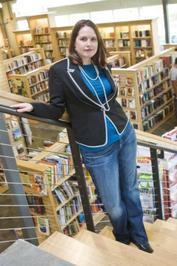
We can read all about your life from your
bio in the jacket flap of your book. So, what's a completely random fact about
you that most people don't know?
When I was in 4th grade, my class performed Shakespeare’s Macbeth
(I was Hecate, the head witch). This began a period of a few years in which I
thought I wanted to be a playwright and would force my cousin to act out skits
with me in front of our parents. Good times.
As a kid, what was your favorite book?
Have your tastes changed since growing up?
I had plenty of favorites, but I probably read “Charlie and the
Chocolate Factory” more than any other. I was enchanted with the idea of an
entire chocolate paradise. Of course, I’m still enchanted by that idea! I still
love Charlie, but these days my reading list typically leans more into young
adult, mostly because I’m a big fan of some romance in my reading material.
Your book,
CINDER, is a futuristic take on the old classic fairy tale of Cinderella. Is
Cinderella your favorite fairy tale? If not—which one is? Why?
Cinderella is definitely one of my favorite tales – largely
because it’s a story that everyone, from every time and place and culture, can
associate with. The desire to improve our station in life is definitely a
universal one. That said, I don’t think it’s possible for me to choose an
all-time favorite fairy tale. It seems to change by the hour!
YOUR BOOK
It's the inevitable question: what
inspired CINDER?
I had the idea to write a series of science-fiction fairy tales
after entering a writing contest with a futuristic retelling of Puss in Boots.
Months later, as I was falling asleep, I had a vision of Cinderella running
down the palace steps… but instead of losing a shoe, her whole foot fell off.
Cyborg Cinderella! It was too good to ignore.
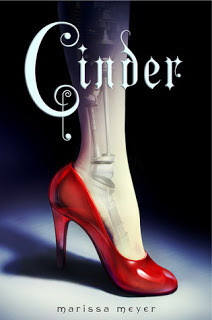
One of the great
things about CINDER is the threat of the Lunars. This is such a refreshing tale on the “evil queen” of fairy
tales, and you did a great job in making her character both realistic and
deliciously bad. Can you tell us how you developed the Lunars and where the
idea came from?
Thank you! The Lunars developed over many drafts. In the earliest
version, they had super crazy powers – like being able to shoot lightning bolts
and fireballs out of their hands (no doubt harking back to my obsession with
sword-and-sorcery as a teen… or maybe Sailor Moon). After awhile, though, their
powers started to change into the more subtle (yet creepier) powers of mind-control
and manipulation. Then at one point I thought that maybe I should have some
sort of scientific explanation for the Lunar power, so I did some research on
military experimentation for crowd control, which is how I stumbled on the idea
of bioelectricity and how it could, potentially, be used to manipulate people’s
thoughts. And bam! The Lunars were born.
Can you tell us
a little bit about the process--particularly the timeline--of writing &
publishing CINDER?
I wrote the first draft of CINDER in just two weeks – it was part
of a contest, the prize for which was a walk-on role in Star Trek. (I didn’t
win.) After that, it took me about two years to rewrite and revise, during
which I also wrote the first drafts of Books 2 and 3. Once it came time to
start submitting it, though, everything happened really fast. I signed with the
first agent I queried. Two weeks later, she submitted the book on a Friday and
we had our first offer the following Monday. It was insane. Fourteen months
later, the book was published. So it took a little over three years from idea
to bookshelves.
If your reader
could only take away one emotion, theme, or idea from CINDER, what would you
want it to be?
Anticipation for Book 2!
YOUR WRITING
What's the most surprising thing you've
learned since becoming a writer?
How hard it is to write when it’s your job! When I was working
full time, I got very good at using up every spare moment to write, even if it
was only recording thoughts at a red light or working feverishly during my
lunch breaks. Now that I’m a full-time writer, though, I too often feel like I
have all the time in the world! Which
means I use that time very poorly. It can be quite detrimental, but I’m happy
to say that sixteen months after quitting the day job, I think I’m finally
starting to get a hang of this full-time writing gig.
[image error]
What do you
think are your strongest and weakest points in writing?
Stongest: I’m neurotically goal-oriented. If I say I’m going to
write 150,000 words in a month, I’m darn well going to do it! I’m nothing if
not determined.
Weakest: Balance. Which kind of goes hand-in-hand with that
neurotically goal-oriented thing. When I have it in my head to do something,
all the rest of my life tends to fall by the wayside. It seems that every time
I finish up a project (say, the a draft on the novel), I have to spend a couple
weeks just trying to get my life back in order. Trying to balance writing and
promotion and socializing and healthy habits and upkeeping the house… I’m not
so good at that.
Beyond the
typical--never give up, believe in yourself--what would be the single best
advice you'd like to give another writer?
I don’t believe in writer’s block, but I do believe that there are
some days when our brains require extra goading. For that, I think it’s
important to have some sort of mental trick that works for you, every time. For
me, it’s bringing my laptop into bed with me, lighting a candle, and enjoying a
glass of wine. Yes, it’s akin to mental bribery, but it always makes me relax
and enjoy the writing process again. For
some, it might be playing a mood-music playlist or putting on a special writing
sweater or reading the acknowledgments pages of their favorite books. Whatever
inspires you to get back to work is a trick worth having in your arsenal!
And now for a giveaway! Leave a comment with your email address below to be entered to win a copy of CINDER--and it's SIGNED! One winner will be picked next Monday; sorry, but this needs to be North America only.


All this week, I'm interviewing awesome authors--and giving away a copy of their book! Come back each day this week for another author and another chance to win an awesome book.
Quick Stats on Today's Author:
Marissa Meyer is the debut author of CINDER
Marissa recently posted about her Spanish book cover, which is, frankly, stunning.
Marissa is, like me, a total Sailor Moon fan! Hurrah!
Cinder, the eponymous heroine, reminded me of greasemonkey Kaylee from Firefly, which you all know is a epic thing.
YOU

We can read all about your life from your
bio in the jacket flap of your book. So, what's a completely random fact about
you that most people don't know?
When I was in 4th grade, my class performed Shakespeare’s Macbeth
(I was Hecate, the head witch). This began a period of a few years in which I
thought I wanted to be a playwright and would force my cousin to act out skits
with me in front of our parents. Good times.
As a kid, what was your favorite book?
Have your tastes changed since growing up?
I had plenty of favorites, but I probably read “Charlie and the
Chocolate Factory” more than any other. I was enchanted with the idea of an
entire chocolate paradise. Of course, I’m still enchanted by that idea! I still
love Charlie, but these days my reading list typically leans more into young
adult, mostly because I’m a big fan of some romance in my reading material.
Your book,
CINDER, is a futuristic take on the old classic fairy tale of Cinderella. Is
Cinderella your favorite fairy tale? If not—which one is? Why?
Cinderella is definitely one of my favorite tales – largely
because it’s a story that everyone, from every time and place and culture, can
associate with. The desire to improve our station in life is definitely a
universal one. That said, I don’t think it’s possible for me to choose an
all-time favorite fairy tale. It seems to change by the hour!
YOUR BOOK
It's the inevitable question: what
inspired CINDER?
I had the idea to write a series of science-fiction fairy tales
after entering a writing contest with a futuristic retelling of Puss in Boots.
Months later, as I was falling asleep, I had a vision of Cinderella running
down the palace steps… but instead of losing a shoe, her whole foot fell off.
Cyborg Cinderella! It was too good to ignore.

One of the great
things about CINDER is the threat of the Lunars. This is such a refreshing tale on the “evil queen” of fairy
tales, and you did a great job in making her character both realistic and
deliciously bad. Can you tell us how you developed the Lunars and where the
idea came from?
Thank you! The Lunars developed over many drafts. In the earliest
version, they had super crazy powers – like being able to shoot lightning bolts
and fireballs out of their hands (no doubt harking back to my obsession with
sword-and-sorcery as a teen… or maybe Sailor Moon). After awhile, though, their
powers started to change into the more subtle (yet creepier) powers of mind-control
and manipulation. Then at one point I thought that maybe I should have some
sort of scientific explanation for the Lunar power, so I did some research on
military experimentation for crowd control, which is how I stumbled on the idea
of bioelectricity and how it could, potentially, be used to manipulate people’s
thoughts. And bam! The Lunars were born.
Can you tell us
a little bit about the process--particularly the timeline--of writing &
publishing CINDER?
I wrote the first draft of CINDER in just two weeks – it was part
of a contest, the prize for which was a walk-on role in Star Trek. (I didn’t
win.) After that, it took me about two years to rewrite and revise, during
which I also wrote the first drafts of Books 2 and 3. Once it came time to
start submitting it, though, everything happened really fast. I signed with the
first agent I queried. Two weeks later, she submitted the book on a Friday and
we had our first offer the following Monday. It was insane. Fourteen months
later, the book was published. So it took a little over three years from idea
to bookshelves.
If your reader
could only take away one emotion, theme, or idea from CINDER, what would you
want it to be?
Anticipation for Book 2!
YOUR WRITING
What's the most surprising thing you've
learned since becoming a writer?
How hard it is to write when it’s your job! When I was working
full time, I got very good at using up every spare moment to write, even if it
was only recording thoughts at a red light or working feverishly during my
lunch breaks. Now that I’m a full-time writer, though, I too often feel like I
have all the time in the world! Which
means I use that time very poorly. It can be quite detrimental, but I’m happy
to say that sixteen months after quitting the day job, I think I’m finally
starting to get a hang of this full-time writing gig.
[image error]
What do you
think are your strongest and weakest points in writing?
Stongest: I’m neurotically goal-oriented. If I say I’m going to
write 150,000 words in a month, I’m darn well going to do it! I’m nothing if
not determined.
Weakest: Balance. Which kind of goes hand-in-hand with that
neurotically goal-oriented thing. When I have it in my head to do something,
all the rest of my life tends to fall by the wayside. It seems that every time
I finish up a project (say, the a draft on the novel), I have to spend a couple
weeks just trying to get my life back in order. Trying to balance writing and
promotion and socializing and healthy habits and upkeeping the house… I’m not
so good at that.
Beyond the
typical--never give up, believe in yourself--what would be the single best
advice you'd like to give another writer?
I don’t believe in writer’s block, but I do believe that there are
some days when our brains require extra goading. For that, I think it’s
important to have some sort of mental trick that works for you, every time. For
me, it’s bringing my laptop into bed with me, lighting a candle, and enjoying a
glass of wine. Yes, it’s akin to mental bribery, but it always makes me relax
and enjoy the writing process again. For
some, it might be playing a mood-music playlist or putting on a special writing
sweater or reading the acknowledgments pages of their favorite books. Whatever
inspires you to get back to work is a trick worth having in your arsenal!
And now for a giveaway! Leave a comment with your email address below to be entered to win a copy of CINDER--and it's SIGNED! One winner will be picked next Monday; sorry, but this needs to be North America only.

Published on May 07, 2012 21:00
Interview Week: Cole Gibsen, author of KATANA
Welcome to Interview Week!
All this week, I'm interviewing awesome authors--and giving away a copy of their book! Come back each day this week for another author and another chance to win an awesome book.
Quick Stats on Today's Author:
Cole Gibsen is the debut author of KATANA
Her blog has the awesome name "Hair Dye and Samurai"
Cole is also the author of BREATHLESS
Cole claims to not be a ninja, but I'm not sure I believe that.
YOU
We can read all about your life from your
bio in the jacket flap of your book. So, what's a completely random fact about
you that most people don't know?
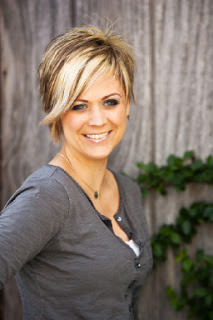 Last year, after Dragoncon, I was sitting in an Applebees in the
Last year, after Dragoncon, I was sitting in an Applebees in the
Atlanta airport when I saw Nicholas Brendan walk by. Much to my brother and
husband’s embarrassment, I screamed, “I LOVE YOU, NICHOLAS BRENDAN!” at the top
of my lungs. He smiled and waved. As if that wasn’t awesome enough, I grabbed
my brother’s girlfriend and—like stealthy ninja—the two of us stalked Nicholas
all the way to his gate. (Okay,
maybe not like ninja. He totally saw
us and I think was on the verge of calling security.)
As a kid, what was your favorite book?
Have your tastes changed since growing up?
My favorite book was, without a doubt, Bunnicula by James Howe. Twenty years later, I’m still go fangirl
over vegetable-draining vampire bunnies. Seriously. Who doesn’t?
In your book,
KATANA, the main character Rileigh finds herself thrown into a world of martial
arts and ninjas. Does this draw from any passions in your own life? Are you
secretly a ninja?!
Two things to know about me:
1. I absolutely adore martial arts.
2. I suck at martial arts.
Seriously. I’ve taken several different styles (karate,
taekwondo, kick boxing, tai chi, etc.) and I’m terrible at them all.
It wasn’t until I received my second black eye and split lip
that I decided it would be more fun (not to mention better for my heath) to
write about martial arts instead of actually doing martial arts.
YOUR BOOK
It's the inevitable question: what
inspired KATANA?
The above black eye and split lip. After having my ass handed to
me in yet another sparring match, I remember looking at a poster of Bruce Lee
on the wall and wishing his spirit would possess me so I could kick a little
butt for once.
Obviously, that didn’t happen. But it did get me thinking about
the possibility of a spirit granting sudden martial arts expertise. That was
when the idea for KATANA was born.
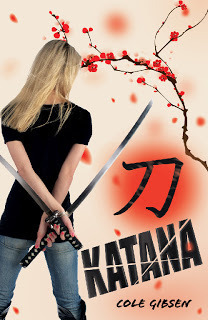
Can you tell us
a little bit about the process--particularly the timeline--of writing &
publishing KATANA?
Oh boy. I definitely wasn’t one of those overnight success
stories you sometimes read about. It took me two books, two years, and over two
hundred rejection letters before I landed my agent. After that it took me
another year of revisions and submissions before I had my first offer. It would
then take another two years before KATANA would sit on a bookstore shelf.
If your reader
could only take away one emotion, theme, or idea from KATANA, what would you
want it to be?
Fun. When was seventeen, I was kicked out of my house and lived
out of my car for a short time. During that period, my only source of
entertainment came from the books I checked out from the library. It was those
books that got me through that difficult time by allowing me to forget about my
problems for a short while. If my book can do the same by giving a teenager a
couple of laughs or allowing them to temporarily forget about their problems,
then I accomplished what I set out to do.
YOUR WRITING
What's the most surprising thing you've
learned since becoming a writer?
Patience. I’ve never been a patient person and I hate going into
situations that I can’t control. This does not bode well for a career in
publishing.
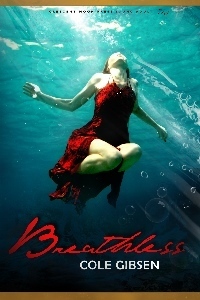
My agent told me that the slogan for publishing should be,
“Hurry up and wait!” and truer words have never been spoken. At first, the
whole thing made me a little crazy. Luckily, I’ve since found my inner Zen
about the waiting game. And when I do find myself starting to crack, I’ve found
that wine helps. A lot.
Beyond the
typical--never give up, believe in yourself--what would be the single best
advice you'd like to give another writer?
Read books in the genre you plan to write. And then read some
more. And after that, read some more.
What do you
think are your strongest and weakest points in writing?
Wow. That’s a really tough question to answer about yourself. I
don’t know if it’s my strongest point
per say, but one of my favorite things to write is snarky dialogue. I also
enjoy writing out a good fight scene.
As far a weak points, when I read books by other authors, some
of them have such talent for creating vivid imagery with setting. I’d love to
improve in that area.
And now for a giveaway! Leave a comment with your email address below to be entered to win a copy of KATANA! One winner will be picked next Monday; sorry, but this needs to be North America only.

All this week, I'm interviewing awesome authors--and giving away a copy of their book! Come back each day this week for another author and another chance to win an awesome book.
Quick Stats on Today's Author:
Cole Gibsen is the debut author of KATANA
Her blog has the awesome name "Hair Dye and Samurai"
Cole is also the author of BREATHLESS
Cole claims to not be a ninja, but I'm not sure I believe that.
YOU
We can read all about your life from your
bio in the jacket flap of your book. So, what's a completely random fact about
you that most people don't know?
 Last year, after Dragoncon, I was sitting in an Applebees in the
Last year, after Dragoncon, I was sitting in an Applebees in theAtlanta airport when I saw Nicholas Brendan walk by. Much to my brother and
husband’s embarrassment, I screamed, “I LOVE YOU, NICHOLAS BRENDAN!” at the top
of my lungs. He smiled and waved. As if that wasn’t awesome enough, I grabbed
my brother’s girlfriend and—like stealthy ninja—the two of us stalked Nicholas
all the way to his gate. (Okay,
maybe not like ninja. He totally saw
us and I think was on the verge of calling security.)
As a kid, what was your favorite book?
Have your tastes changed since growing up?
My favorite book was, without a doubt, Bunnicula by James Howe. Twenty years later, I’m still go fangirl
over vegetable-draining vampire bunnies. Seriously. Who doesn’t?
In your book,
KATANA, the main character Rileigh finds herself thrown into a world of martial
arts and ninjas. Does this draw from any passions in your own life? Are you
secretly a ninja?!
Two things to know about me:
1. I absolutely adore martial arts.
2. I suck at martial arts.
Seriously. I’ve taken several different styles (karate,
taekwondo, kick boxing, tai chi, etc.) and I’m terrible at them all.
It wasn’t until I received my second black eye and split lip
that I decided it would be more fun (not to mention better for my heath) to
write about martial arts instead of actually doing martial arts.
YOUR BOOK
It's the inevitable question: what
inspired KATANA?
The above black eye and split lip. After having my ass handed to
me in yet another sparring match, I remember looking at a poster of Bruce Lee
on the wall and wishing his spirit would possess me so I could kick a little
butt for once.
Obviously, that didn’t happen. But it did get me thinking about
the possibility of a spirit granting sudden martial arts expertise. That was
when the idea for KATANA was born.

Can you tell us
a little bit about the process--particularly the timeline--of writing &
publishing KATANA?
Oh boy. I definitely wasn’t one of those overnight success
stories you sometimes read about. It took me two books, two years, and over two
hundred rejection letters before I landed my agent. After that it took me
another year of revisions and submissions before I had my first offer. It would
then take another two years before KATANA would sit on a bookstore shelf.
If your reader
could only take away one emotion, theme, or idea from KATANA, what would you
want it to be?
Fun. When was seventeen, I was kicked out of my house and lived
out of my car for a short time. During that period, my only source of
entertainment came from the books I checked out from the library. It was those
books that got me through that difficult time by allowing me to forget about my
problems for a short while. If my book can do the same by giving a teenager a
couple of laughs or allowing them to temporarily forget about their problems,
then I accomplished what I set out to do.
YOUR WRITING
What's the most surprising thing you've
learned since becoming a writer?
Patience. I’ve never been a patient person and I hate going into
situations that I can’t control. This does not bode well for a career in
publishing.

My agent told me that the slogan for publishing should be,
“Hurry up and wait!” and truer words have never been spoken. At first, the
whole thing made me a little crazy. Luckily, I’ve since found my inner Zen
about the waiting game. And when I do find myself starting to crack, I’ve found
that wine helps. A lot.
Beyond the
typical--never give up, believe in yourself--what would be the single best
advice you'd like to give another writer?
Read books in the genre you plan to write. And then read some
more. And after that, read some more.
What do you
think are your strongest and weakest points in writing?
Wow. That’s a really tough question to answer about yourself. I
don’t know if it’s my strongest point
per say, but one of my favorite things to write is snarky dialogue. I also
enjoy writing out a good fight scene.
As far a weak points, when I read books by other authors, some
of them have such talent for creating vivid imagery with setting. I’d love to
improve in that area.
And now for a giveaway! Leave a comment with your email address below to be entered to win a copy of KATANA! One winner will be picked next Monday; sorry, but this needs to be North America only.

Published on May 07, 2012 08:20
May 5, 2012
On Communication
I've been a bit incommunicado lately, and I totally apologize! First, A MILLION SUNS came out. Then I had to rewrite SHADES OF EARTH. Then I did a series of travel and writing retreats (more on those later) which required a lot of work and not much time for writing blog posts, answering emails, and updating Twitter. The long and the short of it: I'm behind on all forms of communication.
But! All this week! There will be an interview with a different author each day--followed by a giveaway of a (usually signed) book by each author! Hurrah!
I'm still way behind on Twitter and email though :)

But! All this week! There will be an interview with a different author each day--followed by a giveaway of a (usually signed) book by each author! Hurrah!
I'm still way behind on Twitter and email though :)

Published on May 05, 2012 12:33



